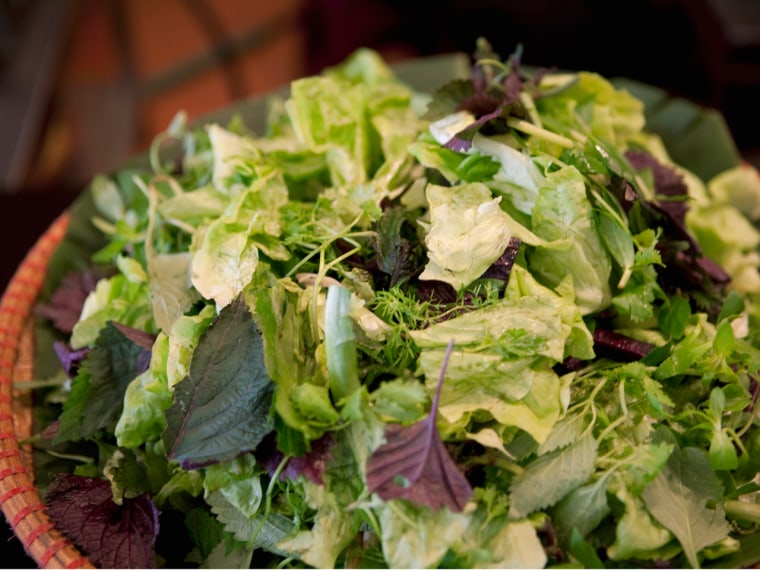Even as an outbreak of parasite-borne illness continues to sicken more U.S. consumers, state and federal officials are refusing to identify the brand or producer of prepackaged salad mix blamed for illnesses -- leaving diners to guess which leafy greens have made people sick and wondering, once again, how to keep themselves safe.
The cyclospora outbreak that has sickened nearly 400 people in 15 states is renewing questions about whether it's best to wash bagged salad or eat it straight from the package. In this case, the rare parasite is a tenacious bug, said Steven Mandernach, Iowa's top food inspector.
"It's really tough to wash off," he said.
Investigators found that the culprit salad mix came from both retail stores and restaurants and was consumed by diners and home cooks, Mandernach said. In all situations, there likely wasn't much consumers could do to prevent infection because the mix came pre-packaged straight from the supplier.
But, critics say, if people knew what brand and manufacturer were behind the outbreak, they wouldn't have to worry about washing.
“It’s ridiculous,” said Bill Marler, a Seattle lawyer who specializes in food safety cases. “Consumers have a right to know. Presumably, you wouldn’t want to buy produce from a manufacturer that has been poisoning you.”
Iowa officials, who first confirmed that bagged lettuce is the culprit in the outbreak of cyclospora food poisoning that has sickened at least 145 people in that state, said Tuesday that there’s no compelling health reason to name the brand or the firm.
“We only release that information if there is a public health risk,” said David Werning, spokesman for the Iowa Department of Inspections and Appeals. “At this point, with the prepackaged salad mix no longer available, we do not have that risk.”
Nebraska officials, who also tagged bagged lettuce in the outbreak, remained mum, too, on the source.
Federal health officials maintained their position that while the salad mix may be linked to state illnesses, it’s still not clear whether it’s the overall source in the cyclospora outbreak -- or outbreaks -- that have hospitalized 21 people so far.
“The national investigation is ongoing and at this point we don’t have enough information to implicate a food vehicle in the outbreak,” Alan Dowell, a spokesman for the Centers for Disease Control and Prevention, said in an email. “It is also still unclear if all of the cases are related to the same outbreak.”
"FDA has not yet determined that the evidence is sufficient to implicate a particular product," said Pat El-Hinnawy, an agency spokeswoman.
The prepackaged salad contains a mix of iceberg and romaine lettuce, as well as carrots and red cabbage, Iowa health officials said Tuesday. Because most of the cyclospora infections occurred in mid-June and early July, the perishable product is likely off the shelves and through the supply chain. No recalls have been issued for any implicated salad mix.
“Thus, there is no ongoing threat to the public health which would require the identification of a particular brand, store or restaurant where the salad mixture was available,” Iowa health officials said in a statement. “In addition, these sites could not have taken any action to prevent contamination of the mixture since it came pre-packaged and ready-to-eat.”
But critics like Marler say that’s still no reason to withhold the name of the product and the manufacturer responsible for those illnesses. Even if the salad mix is not available, consumers could learn whether the company involved has a history of food safety problems and decide whether to continue buying the product or patronizing the places where it was served.
“For the government to make that decision for the public, that we don’t have the right to know to make that decision for our families, it's wrong,” Marler said. “It appears to most people that that’s really a decision in favor of business instead of the public.”
Meanwhile, consumers who want to eat their veggies but are now worried about bagged salad are revisiting the question of whether to wash. Many shoppers believe that it’s best to wash bagged greens again before eating, but food safety experts – and recent research – confirm that re-washing bagged lettuce may be riskier than consuming it straight from the bag.
FDA officials advise that there's no need to re-wash bagged lettuce. "If the package indicates that the contents are pre-washed and ready-to-eat, you can use the produce without further washing."
Christine Bruhn, a researcher in food science and technology at UC Davis, told NBC News that she relies on bagged lettuce, despite repeated recalls of the greens.
She said big produce firms do the best job of cleaning greens with validated processes and chlorinated water. Home cooks and restaurant workers are much more likely to taint their salads through cross-contamination in their own kitchens.
Sinks, counters, knives and other surfaces in home kitchens are more likely to contain bacteria and other germs that transmit illness than the lettuce in the bags.
In 2007, a panel convened for the International Association for Food Protection concluded that leafy greens in sealed bags do not need additional washing and that the risk from outside contamination “may outweigh any safety benefit that further washing may confer.”
FDA and CDC officials said they're continuing to investigate the outbreak, which has reported cases in the following states: Iowa, Nebraska, Texas, Wisconsin, Arkansas, Connecticut, Florida, Georgia, Illinois, Kansas, Minnesota, Missouri, New Jersey, New York and Ohio.
JoNel Aleccia is a senior health reporter with NBC News. You can reach her on Twitter at @JoNel_Aleccia or send her an email.
